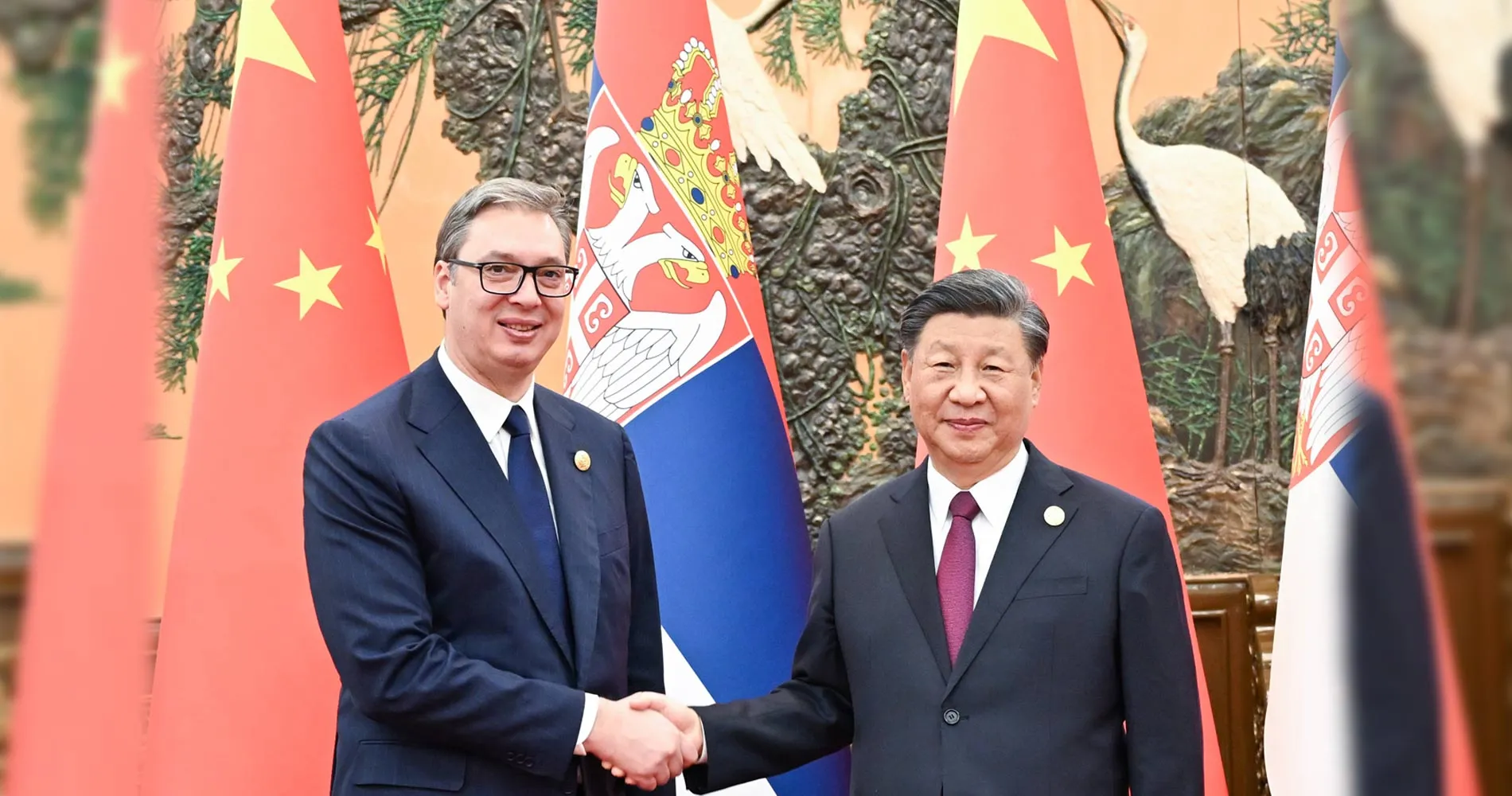Over the past 10 years, China has emerged as one of the most important trading partners and investors in Serbia. Chinese net foreign direct investment (FDI) inflows increased from EUR 2.4 million to some EUR 1.4 billion from 2010 to 2022. China is gaining geostrategic influence in the Western Balkans at the expense of the EU.
Bernd Christoph Ströhm
18 January 2024
French version | German version | Russian version | Spanish version
The aftermath of the 2008 Great Recession accelerated China’s plans to strategically invest in Southeastern Europe. In 2009, Greece was forced to lease two docks of the Greek port of Piraeus to the Chinese state owned COSCO shipping company for 35 years. China bought a majority stake in the port of Piraeus in 2016, with COSCO in control of 67%. Chinese investments into the port of Piraeus have made it one of the most important ports in the Mediterranean.
The COSCO shipping company has been vital for the establishment of the Chinese “Belt and Road Initiative” (BRI) and the “Maritime Silk Road” (MSR). The BRI serves as the main framework for expanding China’s geo-economic presence in Southeastern Europe, including the Western Balkans. With the establishment of the BRI, China has become one of the most important trading partners of Serbia over the past 10 years, with Chinese net FDI inflows increasing from EUR 2.4 million to some EUR 1.4 billion from 2010 to 2022.
Despite its close ties with the governments of Hungary and Serbia, China faces growing difficulties with its “New Silk Road” project in Europe. Over the last couple of years, numerous states – and the EU as a whole – are actively trying to reduce China’s economic influence in their markets owing to concerns about influence peddling and espionage allegations. Italy is even considering its withdrawal from the “New Silk Road” project.
The “New Silk Road” or BRI project has also been criticized due to China’s “debt diplomacy”. Many countries have become heavily indebted to China in connection with these infrastructure projects. This also applies to Chinese investments in the Western Balkans which are financed via loans.
Serbia, as an example, needs to provide state guarantees to facilitate the realization of infrastructure projects, which in turn increases China’s influence over Serbia as a large foreign investor. Serbia’s indebtedness to China is problematic because of, i.a., the lack of transparency of China’s loan contracts with Serbia. In the case of Montenegro, reports have emerged that its state guaranteed loan agreements with China also include clauses facilitating the transfer of land or assets to Chinese creditors in case of default.
For many years, Russia was considered as the great ally of Serbia in the Western Balkans – albeit more ideologically than economically. Due to Russia’s military invasion of Ukraine, China managed to secure greater economic and political influence in the region. The EU, on the other hand, is perceived as aloof and technocratic in Serbia and other Western Balkan countries.
Serbia is an attractive country for Chinese investment. China’s geo-economic influence over Serbia was particularly visible in October 2023, when Serbian President Vučić snubbed the Berlin Process Summit in the Albanian capital of Tirana – choosing instead to personally attend China’s Silk Road summit in Beijing. During the summit President Vučić and Chinese President Xi Jinping signed a free trade agreement which solidified Serbia’s close economic ties to China.
The free trade agreement with Serbia is the first such agreement that China has concluded with a country in Central or Eastern Europe. After the agreement enters into force in mid-2024, citizens of Serbia and China will gradually no longer pay import taxes on certain products. A total of 10 412 Serbian and 8930 Chinese products will benefit from the trade agreement.
The outcome of Serbia’s snap parliamentary and local elections in December 2023 showed that no imminent change of Serbia’s foreign policy is in sight. The ruling “Serbian Progressive Party” claimed victory in both the parliamentary and Belgrade city ballots elections. Representatives of international rights watchdogs have reported irregularities during the vote.
Owing to Serbia’s close ties with Russia and China, the European Commission is treating Serbia’s ongoing EU accession procedure as a sensitive issue. EU Commission President von der Leyen has clearly stated that Serbia belongs in the EU, but that the country’s accession must be linked to Serbia’s aligning its foreign policy with the EU block. The EU wants to limit Serbia’s close ties to China and expects Serbia to join the EU’s sanction regime against Russia.
Although the EU remains an essential partner for Serbia and other Western Balkan countries, considering overall trade and investments, Serbia’s EU accession process is far from complete: 22 out of 35 chapters have been opened to date, with only two chapters provisionally closed.
The recent deteriorating security situation in Northern Kosovo has also strained relations between Serbia and the EU. In October 2023, the European Parliament adopted a joint motion for a resolution on the Banjska attack, calling for measures against the Serbian government, if investigations should reveal a direct involvement of the Serbian government in the attack by Serb militants against the Kosovo Police on 24 September 2023. The former vice-chairman of the Kosovo “Serbian List” party, Milan Radojicic, and the personal bodyguard of the Serbian intelligence chief Aleksander Vulin were allegedly involved in this incident.
European Commission President von der Leyen recognised the evaporating enthusiasm for reforms in the Western Balkans, which are necessary to bring forward the region’s EU accession. This is one reason why the European Commission pledged to stimulate the reform process in the region by earmarking an additional EUR 2 billion in grants and EUR 4 billion in loans to the Western Balkans following the 2023 Berlin Process Summit. Those funds aim to stimulate GDP growth in Western Balkan countries and thus accelerate the region’s EU integration by the year 2030.
It remains to be seen whether the European Commission will achieve its goal to integrate the Western Balkan region into the EU. Serbia has yet to clearly signal its full commitment to joining the EU, as doing so would conflict with China’s and Russia’s geo-economic and geopolitical interests in the Western Balkans.







